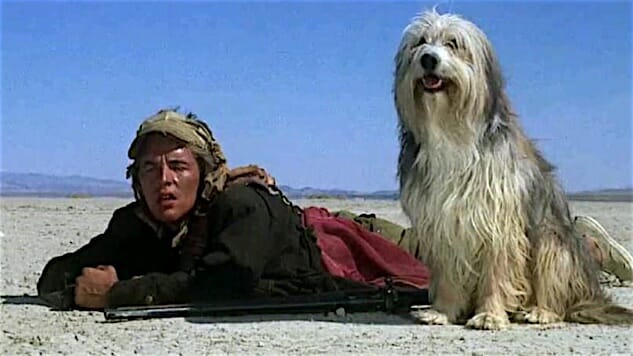An Appreciation for Harlan Ellison and A Boy and His Dog

It’s the post-apocalyptic barren desert landscape of 2024’s America. A scraggly young boy named Vic (Don Johnson) communicates with his partner as they track a female human, a very rare commodity in this world. As they bicker about strategy, it becomes clear that Vic’s partner is a shaggy sheepdog named Blood (voiced by Tim McIntire), with whom Vic communicates telepathically. Vic makes it to the girl and is disappointed to find out that another gang has already raped and murdered her. “They didn’t have to kill her,” he complains to Blood. “She could have been used three or four more times.” As the twangy and uplifting main theme plays over the credits written with a cartoonishly happy font—following a rather crude masturbation joke no less—it gradually dawns on us that these two are our protagonists.
Yes, in a world where all civilized behavior is thrown out of the window and the reptilian brain rules, this rapist boy and his manipulative, enabling canine buddy are as close to any depiction of humanity as we will get. If you’re looking for a role model or any glimmer of hope for civilization in A Boy and His Dog’s world, an abrasively cruel yet inevitable result of man’s folly and penchant for destruction, you’ve come to the wrong place. Yet the film, even at its most bitter takedowns of human cruelty, never lets go of a playful sense of humor that skewers man’s futile goal of superiority in a world that has crumbled beyond recognition. The planet is a rancid shithole ruled by murder, rape, and as we get to the second half of the story, unbridled American fascism, but that doesn’t mean we can’t cackle at our own demise.
Those unfamiliar with the work of the great yet complicated (codeword for “asshole” in some literary circles) Harlan Ellison might be baffled by how a film that contains so many realistic depictions of violence can be so flippant about it. Yet for those with a passing knowledge of Ellison, it’s business as usual. Ellison, who passed away on June 28, was a versatile and contentious powerhouse of a writer who inserted unapologetically nihilistic worldviews even in his most seemingly hopeful work. This includes his Star Trek script for The City on the Edge of Forever, which ended on a surprisingly fatalist note. Like George Carlin, he found the beauty in the individual, but had very little hope for humanity as a whole.
His stories were filled with the eventual demise of humanity. His story I Have No Mouth, But I Must Scream was about a computer who gains sentience and immediately wipes out all people except a handful to torture for its amusement. Soldier, a short story upon which he successfully sued James Cameron due to its similarities with The Terminator, was about a soldier who came back from the future to warn people of the upcoming apocalypse. The people listen to the soldier and change their ways, but why is the soldier still around if the future has changed? Or are we doomed regardless of what we do?
-

-

-

-

-

-

-

-

-

-

-

-

-

-

-

-

-

-

-

-

-

-

-

-

-

-

-

-

-

-

-

-

-

-

-

-

-

-

-

-








































